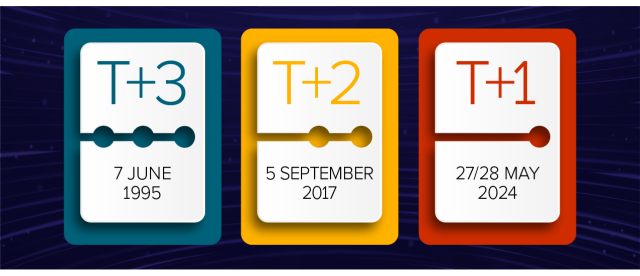ICI Viewpoints
T+1: The Next Step for Evolving Markets Globally
As financial services firms around the world institute processes and procedures to align with T+1 implementation in the United States, Canada, and Mexico, the industry should seize this opportunity to establish one-day settlement as the next global standard. [1]
The move by North American markets to accelerate trade settlement from two business days after trade execution (T+2) to one business day (T+1), effective late May 2024, is a logical step. Global market participants benefit from shortened settlement periods, as such moves can reduce counterparty exposure, improve liquidity, decrease collateral obligations, and expedite cash and security deliveries to retail investors.
Continued Evolution in Trade Settlement
Canadian and US Timelines

The Benefits of Faster Settlement
Large and developed markets, such as those in the US and Europe, are highly regarded for their efficiency and low transaction costs. However, they can still experience stress in times of extreme volatility. During these times, it is evident that markets and investors could benefit from further risk reduction.
For example, amid the onset of the coronavirus pandemic in March 2020, trade volume cleared through the US-based Depository Trust and Clearing Corporation (DTCC) spiked 240 percent over its daily average and more than 15 percent above its previous peak set during the global financial crisis.[2] European markets experienced similar trading conditions early in the pandemic, leading measures of implied volatility—also known as fear indexes—in European equities to jump far above average levels.[3]
The unprecedented trade volume required market participants to post additional collateral during the two-day settlement period to continue transacting on behalf of customers. In turn, the large collateral obligations led some brokers to limit their order-taking activity, thereby increasing opportunity cost for investors and thinning market liquidity. A shift to T+1 will significantly reduce such risks going forward.
Overcoming Challenges
No doubt, the coming misalignment of settlement cycles between North America and other jurisdictions will present some operational challenges—another reason for all jurisdictions to optimize operational frameworks and, ultimately, accelerate settlement cycles to a T+1 global standard.
Improving global securities markets is no easy task, as broad industry coordination is required to address related operational challenges. In Europe, the trading and settlement infrastructure is vastly more complex than in the US, spanning several jurisdictions, with 41 trading exchanges and 31 central securities depositories.[4] To make T+1 feasible on the continent, any adjustments to post-trade infrastructure, updates to technology systems, or further automation of trade processing would need to be synchronized across these constituents, as would the timing of cross-currency transactions.
In a positive first step, the European Securities and Markets Authority recently published a paper calling for comments on a potentially shortened settlement cycle in the EU. ICI and ICI Global are contributing to these efforts and are helping to study the possible impacts of T+1 settlement in Europe.
Other jurisdictions have also started to evaluate and plan for the next step in their evolutionary process and will likely join the move to T+1 settlement in the future. Along with our partners at SIFMA, DTCC, and other industry-leading organizations, ICI and ICI Global are actively supporting members with T+1 implementation in the US and assisting various jurisdictions as they develop and execute their own plans.
A Step Forward
ICI and ICI Global are ready to lead the way toward more efficient markets. We encourage our members and other market participants to engage in our upcoming educational seminars and working groups. Together, we can overcome the challenges of evolving global markets and advance the shared objectives of creating more efficient, liquid, and equitable conditions for all investors.
Notes
[1] These countries join India, which fully implemented T+1 settlement in early 2023.
[2] Source: DTCC. Advancing Together: Leading the Industry to Accelerated Settlement, February 2021.
[3] Based on ICI calculations of Bloomberg data. See Experiences of European Markets, UCITS, and European ETFS During the COVID-19 Crisis, December 2020.
[4] Source: The Association for Financial Markets in Europe. T+1 Settlement in Europe: Potential Benefits and Challenges, September 2022.
R.J. Rondini is the Director of Securities Operation for the Investment Company Institute.
